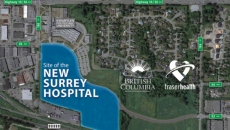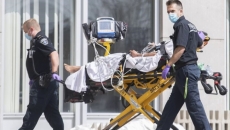Canada is forecast to see a resurgence of COVID-19 and it could speed up even more if the Omicron variant replaces Delta, chief public health officer Dr. Theresa Tam said Friday.
With highly transmissible Delta variant predominating & #Omicron looming, we must maximize layers of protection: full series of #COVID19Vaccines PLUS booster doses as recommended PLUS #WashMaskSpace/#MaskFit, #GoodVentilation, More ➡️https://t.co/awMKelMQ9A pic.twitter.com/gVgo9DCYcj
— Dr. Theresa Tam (@CPHO_Canada) December 10, 2021
New federal modelling shows that if it's assumed Omicron is three times more transmissible than Delta and becomes the dominant strain, then the number of daily cases in Canada could explode from about 3,300 currently to 26,600 by mid-January.
If Delta remains dominant, then the number of cases by that date could be as low as 2,900, if transmission is reduced by 15 per cent, or as high as 15,000, if transmission increases 15 per cent. If transmission remains the same, Canada could see 7,000 daily cases.
The modelling did not include projections for hospitalizations or deaths if Omicron becomes dominant.
Tam said so far researchers have encountered more moderate cases associated with Omicron, but there is more to learn about the severity of the variant and she urged caution during the coming holiday season.
Even if a tiny proportion of cases cause serious illness or death, hospitals and intensive care units could still be overrun if the virus spreads rampantly.
"I've been saying the winter period is going to be a bumpy road towards a brighter spring. So this is another bump on the road and we still don't know enough about the Omicron variant except it looks like it's very transmissible," Tam said at a news conference Friday.
She said there have been 87 confirmed cases of Omicron reported in seven jurisdictions in Canada, all of which have been asymptomatic or mild.
Although most of the initial cases were detected in recent international travellers or their close contacts, cases with no known links to travel have been reported more recently, which may be indicative of community transmission, Tam warned.
She advised that holiday gatherings should be kept small and follow local health restrictions, while deputy chief public health officer Dr. Howard Njoo suggested even fully vaccinated people consider wearing masks indoors and opening windows.
Vaccines are a "gift" that Canada did not have during the last holiday season, Tam said, and recent approval of vaccines for children ages five to 11 means 95 per cent of the Canadian population is now eligible for immunization.
She said 81 per cent of the population has at least one dose and 76 per cent is fully vaccinated. For the five- to 11-year-old age group, 17 per cent have received at least one dose and one per cent are fully vaccinated.
Prime Minister Justin Trudeau visited a children's vaccination clinic in Toronto on Friday amid concerns that some parents are hesitant to vaccinate their kids.
Among youth and adults aged 12 to 59, unvaccinated people were 32 times more likely to be hospitalized with COVID-19, while for those over 60, unvaccinated people were 16 times more likely to be hospitalized, Tam told the briefing.
Still, people should take Omicron into consideration if they're planning to travel for the holidays, particularly those leaving the country.
Health Minister Jean-Yves Duclos said Friday travellers should expect delays and hassle at the airport and be aware that the situation could suddenly worsen.
"If they're thinking of travelling (Omicron) should be a serious alarm bell, a serious concern for them," Duclos said. "It's going to be uncertain and risky."
In response to the detection of Omicron, Canada quickly imposed travel measures to curb the spread that include banning visitors who have recently travelled through 10 African countries.
The federal government has also said all passengers entering Canada, except those from the United States, need to be tested upon arrival and isolate until they get their results.
However, Duclos acknowledged Friday that Canadian airports do not yet have the capacity to fully test all non-U.S. international arrivals.
Here's what Canadian public health officials know about the variant so far:
Prevalence
— The Delta variant of COVID-19 continues to predominate in Canada and globally, but spread of the Omicron variant has increased. While most of Canada's Omicron cases are linked to recent travel, federal public health officials say there is now evidence that community transmission is taking place in some areas.
Transmissibility
— Omicron has potential to spread more quickly than Delta, which was already highly transmissible.
— In South Africa, cases have risen much quicker with Omicron than they did in previous waves.
— Greater transmissibility or reduced protection from prior infection or vaccination could drive resurgence.
Severity
— It's not currently known whether Omicron carries a higher or lower risk of severe illness or death.
— Some of the current COVID-19 treatments may be less effective against Omicron than against other variants.
— Larger numbers of cases could impact health-care capacity. If it's assumed Omicron is three times more transmissible than Delta and becomes the dominant strain, the latest modelling suggests the number of daily cases in Canada could explode to 26,600 by mid-January from about 3,300 currently.
Immunity
— The effectiveness of current vaccines and their impact on Omicron is under investigation. There may be decreased protection against infection, but some level of protection against severe disease is likely to remain.
— Omicron may be able to escape immunity gained from prior infection.
— Omicron cases have been detected in both vaccinated and unvaccinated people.






